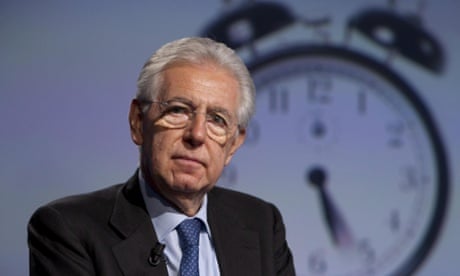The eurozone crisis threatened to flare up again on Thursday as outgoing Italian prime minister Mario Monti held talks with centrist politicians over the agenda for reform which he published on Christmas Eve.
Some analysts believe Monti could assemble a coalition for next February's general election, setting up a battle with his predecessor Silvio Berlusconi.
The Vatican's newspaper, Osservatore Romano, offered support for Monti, saying his message was "an appeal to recover the higher and more noble sense of politics that is ... to take care of the common good".
But Berlusconi attacked Monti's performance, saying on Rai 1's Unomattina TV programme that pressure from European countries, particularly Germany, had "crushed" Monti's technocratic administration. The head of Italy's centre-right People of Liberty party also attempted to woo the Italian public by pledging to abolish a property tax introduced since he left office.
Jens Weidmann, the president of Germany's Bundesbank, warned Italian politicians that the country could not afford to stray from the reform path taken by Monti during his 13 months in power. Weidmann told the business news magazine Wirtschaftswoche that any deviation would be "disastrous".
"Italy suffers from low growth, low productivity and lack of innovation. But under the Monti government Italy has set ambitious goals for reform in order to regain the confidence of investors, and had success with it," said Weidmann.
He said eurozone leaders "must not underestimate the distance ahead" before the region's debt crisis is resolved.
German finance minister Wolfgang Schäuble was more upbeat. "I think the worst is behind us,"he said, arguing that European leaders had realised during 2012 that they must push on with economic reforms to maintain competitiveness.
With Germany also heading to the polls next year, Schäuble claimed conditions in Europe's largest economy were "better than expected".
In Spain, though, small shareholders who invested in Bankia when it floated in 2011 were warned that their stakes would be virtually wiped out when the bank is recapitalised. Spain's bank rescue fund has calculated that Bankia, which was riddled with toxic property debts, has a negative value of €4.2bn. New capital is expected from the EU, possibly on Friday, but the price will be borne by an estimated 350,000 domestic investors.
The news came as Spanish healthcare workers held more protests on Thursday against plans to privatise some hospitals and health centres in the latest signal of opposition to Spain's austerity programme.
The tensions in Europe, combined with the ongoing fiscal cliff deadlock in Washington, made for a jittery day for those City workers who returned to their desks after the Christmas break. After initially rallying, the FTSE 100 fell back to end the day unchanged as traders grew more nervous about the situation in America.
An early sell-off in New York wiped 100 points off the Dow Jones at one stage, and came after Japan's Nikkei closed at its highest level in 21 months. Japanese investors were encouraged by a pledge from the country's new government to battle deflation and kickstart the economy through new stimulus measures.
In the foreign exchange markets, the pound fell to a two-month low against a basket of currencies. Traders said fears over the UK economy were hitting sterling.
